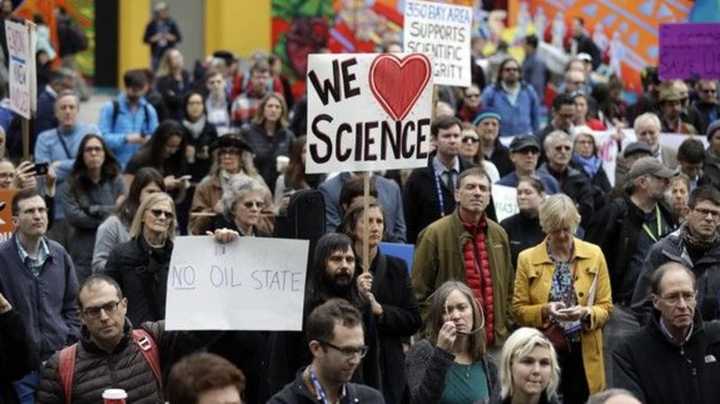Berman, a Horace Greeley High School grad who is now a postdoctoral fellow at the University of Texas Health Science Center in San Antonio, got together with like-minded folks last month to organize the April 22 event, timed to coincide with Earth Day.
Co-organizers are Caroline Weinberg, a New York-city based public health educator, and Valorie Aquino, an anthropology doctoral student at the University of New Mexico in Albuquerque.
What started as a few “tweets” between colleagues, morphed through social media – like a lot of movements these days -- into a March for Science account with more than 300,000 followers and a Facebook group with more than 800,000 members, according to a report by sciencemag.org.
Before they knew it, plans for the D.C. took flight and science supporters in more than 100 cities – including New York City, Albany and Ithaca – were signing up to hold demonstrations the same day.
Organizers say the march is a celebration of, and demonstration of support for, science.
Scientists themselves appear to be of two minds about whether the march is “political,” said a report by Forbes.com.
But as the march gains momentum, even mainstream science organizations are saying they might have to take to the streets, according to a report by washingtonpost.com.
The organizers’ mission, principles and goals statements say the march is a “call to support and safeguard the scientific community.”
Referring to “recent policy statements” made by President Donald J. Trump’s administration, organizers said scientists’ worries are shared by “hundreds of thousands of people around the world.”
“The mischaracterization of science as a partisan issue, which has given policymakers permission to reject overwhelming evidence, is a critical and urgent matter,” its mission statement read.
Scientists can no longer hide in their labs and behind journals, but should take a public stand, where they can be counted, march organizers say.
A recent piece in The New York Times quoted Berman as saying that the march is a protest, but not a political one.
The folks making the decisions in the nation’s capital are the ones marchers hope to reach, Berman told the Times.
The message is that lawmakers and leaders need to “listen to evidence,” the Times reported.
According to sciencemag.com, despite the debate over the reasons behind the march, organizers have created a web page, with a donate button, and online store that sells swag such as T-shirts for $25 a pop.
Berman, Weinberg and Aquino have formed a steering committee and key posts and thousands of volunteers are lining up for assignments, said the sciencemag.org story.
Sister marches are being promoted on Twitter in Europe, Canada, Mexico, Australia and Hong Kong, to name a few spots.
They are also working with the Earth Day Network, an environmental advocacy group – hence, the April 22 (Earth Day) date for the march.
Berman got his undergraduate degree in biology from Rochester Institute of Technology, and a doctoral degree in philosophy from the State University of New York at Buffalo - School of Medicine & Biomedical Sciences where he studied physiology.
To visit the March for Science website, click here.
To read the sciencemag.org story, click here.
To read The New York Times piece, click here.
To read the Forbes.com article, click here.
To read the Washington Post report, click here.
Click here to follow Daily Voice Chappaqua and receive free news updates.

